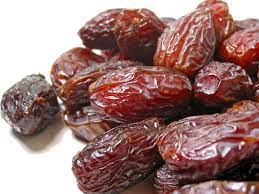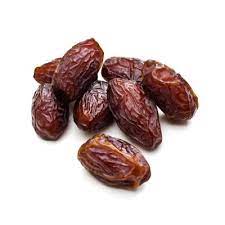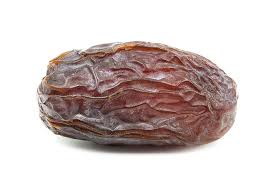Dates Fruit are known for their sweet and caramel-like flavor. These fruits are widely cultivated in regions with hot and arid climates, primarily in the Middle East, North Africa, and parts of South Asia. Dates have been a staple food in these regions for thousands of years and hold cultural and culinary significance.
Dates are typically oval or cylindrical in shape and range in size from small to medium. They can vary in color from bright red to deep brown, depending on the variety and ripeness. Fresh dates are plump and moist, while dried dates are wrinkled and have a firmer texture. Fresh dates are soft and chewy, with a slightly wrinkled skin. When you bite into one, the flesh is tender, and it may contain a small, elongated pit or seed.
Dates are renowned for their intensely sweet and rich flavor. They have a natural sweetness reminiscent of caramel, honey, or brown sugar. This sweetness makes them a popular natural sweetener in various dishes and desserts.
Dates are a nutritious fruit. They are a good source of energy due to their high sugar content, primarily glucose and fructose. Dates also provide essential nutrients such as dietary fiber, vitamins (especially B vitamins), and minerals (including potassium, magnesium, and iron). They are a good choice for a quick energy boost and are often consumed by athletes and those in need of quick sustenance.
Dates are incredibly versatile in the kitchen. They can be eaten on their own as a snack, added to salads, used in smoothies, blended into date paste for sweetening recipes, and incorporated into both sweet and savory dishes. In Middle Eastern cuisine, dates are often paired with nuts or used in desserts like ma’amoul and baklava. Stuffed dates are another popular treat, where they are filled with ingredients like almonds or cream cheese.
Dates offer various health benefits. They are a good source of dietary fiber, which aids in digestion and helps regulate blood sugar levels. Additionally, dates contain antioxidants that may have anti-inflammatory properties. The vitamins and minerals in dates can support overall health and well-being.
Dates are a sweet and nutritious fruit with a long history of cultivation and culinary use in regions with hot climates. They offer a delightful combination of flavor and health benefits, making them a popular choice in a variety of dishes and snacks worldwide.
The Economic Importance and Uses of Dates Fruit

Dates are a popular fruit that holds significant economic importance and serves various uses.
Here are several ways in which dates are economically valuable and utilized:
1. Food Consumption: Dates are primarily consumed as a food source. They are a nutritious and energy-rich fruit, making them an essential part of diets in many regions. Their high sugar content provides a quick source of energy.
2. Export and Trade: Dates are a major agricultural export in countries where they are grown. This trade contributes significantly to the economy of these nations. The Middle East, North Africa, and some parts of South Asia are major producers and exporters of dates.
3. Agriculture and Employment: Date palm cultivation provides employment opportunities to many people, from date farmers to laborers involved in harvesting and processing. This contributes to rural livelihoods and economic stability.
4. Date Products: Dates are used to make various products, including date syrup, date paste, date jam, and date sugar. These products have a longer shelf life and are used in cooking, baking, and confectionery production.
5. Medicinal Uses: Dates have several health benefits and are used in traditional medicine for their nutritional and therapeutic properties. They are rich in vitamins, minerals, and dietary fiber, making them useful for digestive health, anemia prevention, and bone health.
6. Date Vinegar: Date vinegar is made from fermented dates and is used in cooking and salad dressings. It’s a valuable product that diversifies the date industry and provides additional revenue.
7. Livestock Feed: Dates that are not suitable for human consumption can be used as livestock feed, providing an additional income source for date farmers.
8. Alcohol Production: In some regions, dates are used to make alcoholic beverages such as date wine and date brandy. While this is not as widespread as other uses, it can still generate revenue.
Read Also: Dates Stigma: Economic Importance, Uses and By-Products
9. Cosmetics and Skincare: Date oil, extracted from date seeds, is used in cosmetics and skincare products for its moisturizing and antioxidant properties. This creates an additional market for date-derived products.
10. Landscaping: Date palms are used in landscaping and urban planning, which can contribute to the aesthetic appeal of cities and tourist destinations. This can indirectly boost local economies through tourism.
11. Biofuel Production: Research is ongoing into using date palm waste as a source of biofuels, which could provide an alternative energy source and contribute to sustainability.
12. Traditional and Cultural Uses: Dates hold cultural and traditional significance in many societies. They are often used in religious ceremonies and celebrations, contributing to cultural preservation and heritage.
The Products and By-products That Can Be Derived From Dates Fruit

Dates are a versatile fruit that can yield various products and by-products.
Here’s a list of some of the primary products and by-products derived from dates:
1. Fresh Dates: The primary product is the fresh date fruit itself. Dates can be consumed directly as a nutritious and sweet snack. They come in various varieties, each with its unique flavor and texture.
2. Dried Dates: Drying dates is a common method to extend their shelf life. Dried dates are often used as a natural sweetener in various recipes, such as desserts, smoothies, and energy bars.
3. Date Syrup: Date syrup is made by boiling dates and extracting their natural sugars. It is a healthy alternative to refined sugar and can be used as a sweetener in cooking, baking, or as a topping for pancakes and waffles.
4. Date Paste: Date paste is a thick, spreadable product made by blending dates with water. It can be used as a natural sweetener in recipes, especially in vegan and gluten-free baking.
5. Date Sugar: Date sugar is created by dehydrating and grinding dates into a fine powder. It can be used as a sweetener in baking and cooking, similar to brown sugar.
Read Also: Dates Ovary: Economic Importance, Uses and By-Products
6. Date Jam: Date jam or date spread is made by cooking dates with water and sometimes adding spices or citrus. It’s a delicious topping for bread, toast, or as a filling for pastries.
7. Date Vinegar: Date vinegar is a fermented product made from dates. It can be used in salad dressings, marinades, and as a flavor enhancer in various dishes.
8. Date Oil: Date oil is extracted from date pits (also known as date seeds). It is used in cosmetics and skincare products due to its moisturizing properties.
9. Date Seed Coffee: Roasted and ground date seeds can be used as a caffeine-free coffee substitute. It’s often referred to as “date seed coffee.”
10. Animal Feed: Date by-products, such as date pits and date leaves, can be used as animal feed, particularly for livestock.
11. Date Palm Wood: The wood from date palm trees can be used in construction, furniture making, and various handicrafts.
12. Date Leaf Products: Date palm leaves are used to make various products like baskets, mats, hats, and even roof thatching in some regions.
13. Biofuel: Researchers have explored the use of date palm biomass, including date pits and leaves, as a potential source of biofuel.
14. Fertilizer: Date palm waste, such as pruned fronds and trimmings, can be composted or processed into organic fertilizer.
15. Medicinal Extracts: Some medicinal products are derived from date extracts, particularly for traditional medicine practices.
16. Date Wine and Liquor: In some cultures, date wine and spirits are produced by fermenting dates. These alcoholic beverages have a unique flavor profile

In conclusion, dates are economically important due to their widespread consumption, export, and trade, as well as their use in various industries, including food processing, cosmetics, and agriculture. They play a vital role in the economies of regions where they are grown, providing income and employment opportunities to many people.
Read Also: The Role of Livestock Farming in a Sustainable Food System
